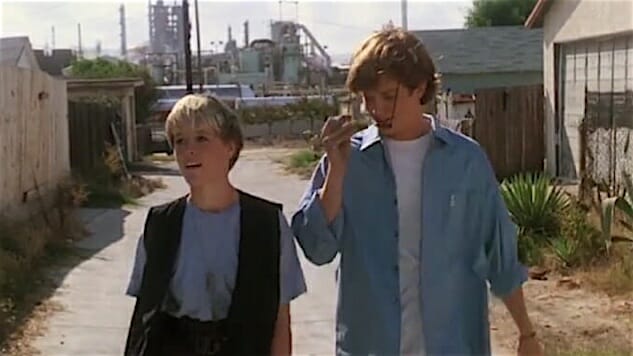“You Look Good Wearing My Future”: Introducing a Teen to the Teen Canon of the 1980s
Part 6: Some Kind of Wonderful

Grace was interested in a reprieve from the color-saturated bleakness of Heathers so I took her back to the land of Scrappy Working Class White Kids Versus The World. I couldn’t remember if Some Kind of Wonderful had anything to recommend it artistically but I did remember liking it, mostly due to Mary Stuart Masterson’s adorable performance as latchkey drummer-girl Watts (yes, named after Charlie).
Despite the re-teaming of John Hughes and Howard Deutsch, Some Kind of Wonderful underperformed at the box office back in 1987. The issue might have been Retread Disease, since the film was basically a gender-reversed Pretty In Pink-in fact, both Andrew McCarthy and Molly Ringwald turned the project down because they felt it was too derivative of movies they’d already made. It might have been an attention span issue: Apparently Hughes was feeling much more inspired by a new idea, and was blowing off rewrites in favor of a new script, which turned out to be Ferris Bueller’s Day Off. Maybe it was dissent in the ranks; Deutsch was replaced by Martha Collidge as director, then Hughes didn’t like the darker direction she was taking it and canned her and got Deutsch back. Deutsch fired Kyle MacLachlan, who’d been cast as the obligatory Rich Misogynist Asshat without which you almost cannot have a John Hughes movie. There seems to have been a lot of drama behind the scenes on this one. All well and good, but was there any fire to it for a Teen of Now?
Honestly, when I embarked on this little teen-indoctrination project I figured there’d be some serious limits to what Grace had the patience to sit through, and I’ve been amazed at how well most of these films seem to be holding up.
“So, it’s another Pretty in Pink; she said. “Except the soundtrack isn’t as good.”
“Not as iconic,” I said, shrugging. “Personally I think naming a character after a Stones tune and then playing a cover of it really upfront like that—yeah, it’s a little on the nose for me.”
“Guys are so dumb.”
“Oh?”
“Well… Amanda Jones is so much less cool than Watts. And if she’s supposed to be this Helen of Troy type,” Grace said (Grace is a Classics Club geek), “she should have been way more gorgeous than that chick. The one who plays Watts is way prettier, so if it’s about pretty versus smart or pretty versus, you know, like, loyal? Or whatever? Watts wins hands down either way. It makes no sense for Keith to be into Amanda in the first place.”
“Well, who we like doesn’t always make sense.”
“In real life? Of course not. This is fiction.”
“What’s your point?”
-

-

-

-

-

-

-

-

-

-

-

-

-

-

-

-

-

-

-

-

-

-

-

-

-

-

-

-

-

-

-

-

-

-

-

-

-

-

-

-








































